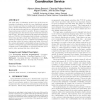Free Online Productivity Tools
i2Speak
i2Symbol
i2OCR
iTex2Img
iWeb2Print
iWeb2Shot
i2Type
iPdf2Split
iPdf2Merge
i2Bopomofo
i2Arabic
i2Style
i2Image
i2PDF
iLatex2Rtf
Sci2ools
121
click to vote
EUROSYS
2008
ACM
2008
ACM
DepSpace: a byzantine fault-tolerant coordination service
The tuple space coordination model is one of the most interesting coordination models for open distributed systems due to its space and time decoupling and its synchronization power. Several works have tried to improve the dependability of tuple spaces through the use of replication for fault tolerance and access control for security. However, many practical applications in the Internet require both fault tolerance and security. This paper describes the design and implementation of DepSpace, a Byzantine fault-tolerant coordination that provides a tuple space abstraction. The service offered by DepSpace is secure, reliable and available as long as less than a third of service replicas are faulty. Moreover, the content-addressable confidentiality scheme developed for DepSpace bridges the gap between Byzantine fault-tolerant replication and confidentiality of replicated data and can be used in other systems that store critical data. Categories and Subject Descriptors C.2.4 [Computer S...
Byzantine Fault Tolerance | Byzantine Fault-tolerant Coordination | Byzantine Fault-tolerant Replication | EUROSYS 2008 | System Software |
| Added | 10 Mar 2010 |
| Updated | 10 Mar 2010 |
| Type | Conference |
| Year | 2008 |
| Where | EUROSYS |
| Authors | Alysson Neves Bessani, Eduardo Adílio Pelinson Alchieri, Miguel Correia, Joni da Silva Fraga |
Comments (0)

